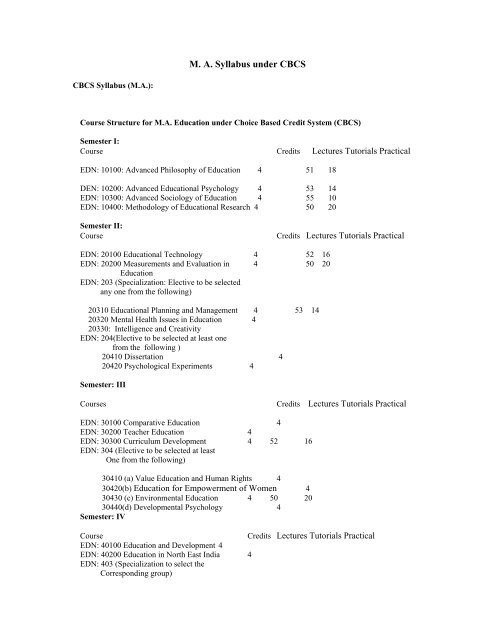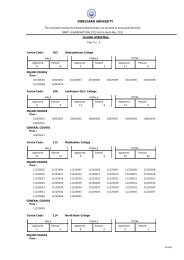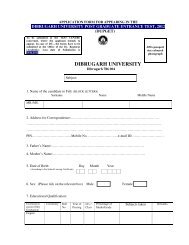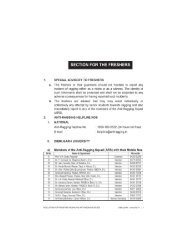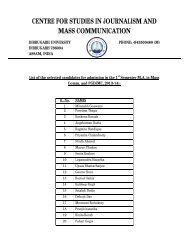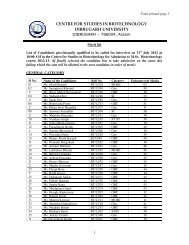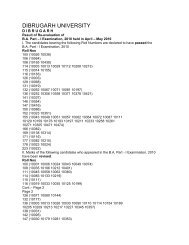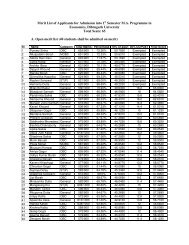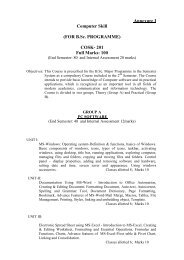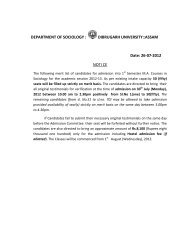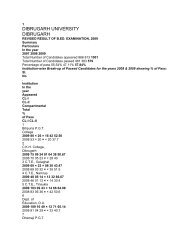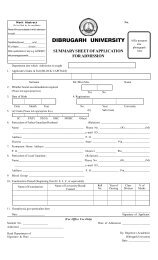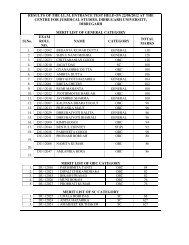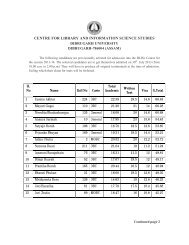M. A. Syllabus under CBCS - Dibrugarh University
M. A. Syllabus under CBCS - Dibrugarh University
M. A. Syllabus under CBCS - Dibrugarh University
You also want an ePaper? Increase the reach of your titles
YUMPU automatically turns print PDFs into web optimized ePapers that Google loves.
M. A. <strong>Syllabus</strong> <strong>under</strong> <strong>CBCS</strong><strong>CBCS</strong> <strong>Syllabus</strong> (M.A.):Course Structure for M.A. Education <strong>under</strong> Choice Based Credit System (<strong>CBCS</strong>)Semester I:Course Credits Lectures Tutorials PracticalEDN: 10100: Advanced Philosophy of Education 4 51 18DEN: 10200: Advanced Educational Psychology 4 53 14EDN: 10300: Advanced Sociology of Education 4 55 10EDN: 10400: Methodology of Educational Research 4 50 20Semester II:CourseCredits Lectures Tutorials PracticalEDN: 20100 Educational Technology 4 52 16EDN: 20200 Measurements and Evaluation in 4 50 20EducationEDN: 203 (Specialization: Elective to be selectedany one from the following)20310 Educational Planning and Management 4 53 1420320 Mental Health Issues in Education 420330: Intelligence and CreativityEDN: 204(Elective to be selected at least onefrom the following )20410 Dissertation 420420 Psychological Experiments 4Semester: IIICoursesCredits Lectures Tutorials PracticalEDN: 30100 Comparative Education 4EDN: 30200 Teacher Education 4EDN: 30300 Curriculum Development 4 52 16EDN: 304 (Elective to be selected at leastOne from the following)30410 (a) Value Education and Human Rights 430420(b) Education for Empowerment of Women 430430 (c) Environmental Education 4 50 2030440(d) Developmental Psychology 4Semester: IVCourseCredits Lectures Tutorials PracticalEDN: 40100 Education and Development 4EDN: 40200 Education in North East India 4EDN: 403 (Specialization to select theCorresponding group)
40310 Group A: Economics of Education 4 55 1040320 Group B: Guidance and Counselling 4 50 2040330 Group C: Special Education 4EDN: 40400: Higher Education in India 4
Details <strong>Syllabus</strong> of the M.A.1 st Semester Programme in Education <strong>under</strong>Choice Based Credit System: Session 2009-2010Course No. : EDN 10100Title of the Course: Advanced Philosophy of EducationName of the Course Teacher: Pranjal BuragohainUnits No of Lecture No. ofTutorialUnit 1.-Introduction-Epistemology, Metaphysics and Axiology-Nature of Philosophy of Education—directivedoctrine, a liberal discipline, an activity-Philosophy of Beauty-Morality and Life13222310Unit 2. Schools of philosophy (Indian schools)Vedic Philosophies-----Samkhya-- basic tenants with specialreference to Purusha and Prakriti,educational implications.--Yoga—basic tenants, Astangika yoga,Educational implications.-- Vedanta—Special reference to Dvita,Advaita and Vishistadvaita, their basictenants, Educational implications.333310Unit 3. Non-Vedic Philosophies—--Carvaka—epistemology, Carvaka ethicsEducational implications.--Jainism—basic principles of Jainism,educational implications.--Buddhism—the teachings of Buddha, thephilosophical principles of Buddhism,educational implications.222310Unit 4. Schools of Philosophy (Western schools)--IdealismNaturalismPragmatism--Their educational implicationswith special reference to epistemology,axiology and the process of education.222310Unit 5. Contemporary philosophies- Existentialism—(Contribution ofNietzsche and Sartre) Characteristics ofExistentialism, educational implications-Logical positivism—propositions(analytical and empirical), educationalImplications.32310-Post-modernism (Contribution of Derridaand Mitchell Foucault), educationalimplications-Islamic Education thought32
Unit 6. Views on education ofVivekanandaGandhiTagoreSankardevaDewey2222231051 18Total Lectures of 1 hour duration = 51Tutorial classes of 1 hour duration = 18Total Credits after calculation = 4Suggested References:Bhatia, Kamala and Baldev Bhatia, The Philosophical and Sociological Foundations ofEducation, Doaba House: Delhi, 1994.Chakrabarti, Mohit, Pioneers in Philosophy of Education, Concept Publishing Company:New Delhi, 2002.Chaube, S. P. and Akhilesh Choube, Philosophical and Socioogical Foundations ofEducation, Vinod Pustak Mandir: Agra-2.Dash, B. N., Principles of Education and Education in the Emerging Indian Society,Ajanta Prakashan: Delhi, 2004.Sahu, Bhagirathi, The new Educational Philosophy, Sarup and Sons: New Delhi, 2002.Sarmah, Mukul Kumar, Principles of Education, Banalata <strong>Dibrugarh</strong>, 2006.Seetharamu, A.S., Philosophy of Education, Ashish Publishing House: New Delhi, 2004.Sharmah, R. N., History of Indian Philosophy, Surjeet Publications: Delhi, 2004.Shukla, Ramakant, Gandhian Philosophy of Education, Sublime Publications: Jaipur,2002.Sinha, J. N., Introduction to Philosophy, New central Book Agency (P) Ltd.: Kolkata,2006.Wingo, G. Max, Philosophies of Education, Sterling Publishers Pvt. Ltd.: New Delhi,1975.
Details <strong>Syllabus</strong> of the MA 1 st Semester Programme in Education <strong>under</strong>Choice Based Credit System: Session 2009-2010Course No. : EDN 10200Title of the Course: Advanced Educational PsychologyName of Course Teacher : Dr Krishna Prasad GogoiObjective:(a) To make <strong>under</strong>stand the students about the contributions of different Schools of Psychology toEducation.(b) To make a critical analysis of different theories of learning, Intelligence, Personality etc.(c) To enable the learner to <strong>under</strong>stand implications of psychological theories for Education(d) To know the determinants and adjustment mechanisms of Personality.Unit Topic No. ofLecturesUnit – I Introduction to Educational Psychology and Different schools ofPsychology :Behaviorism1Gestaltism1Psycho-analysis1Structuralism1Functionalism1Humanist Psychology’s view ( Maslow, Rogers, Allport )3No. ofTutorials1Recent trend in contemporary psychologyCognitive psychologyTranspersonal psychologyPhenomenological approach2221Unit – II Theories of Learning :Nature of Learning –Gagne's hierarchy of learningConnectionist or behaviourist theories(a) Thorndike’s theory(b) Guthries’s continuity theory(c) Hull’s drive reduction theory(d) Classical &operant conditioning theory(e) SR Learning Theory by Dollard & MillerCognitive Theories :(a) Theory of insightful learning(b) Lewin’s Field theory(c) Tolman’s sign learning(d) Bandura’s social learning theory111112111132
Unit - III Development of the concept of Intelligence :Factor theories of Intelligence:(a) Uni-factor theory(b) Two factor theory(c) Multifactor theory(d) Group factor theory(e) Guilford structure of intellectCognitive Theories :(a) Cattell and Horn’s theory(b) Campion and Brown’s theory(c) Stern berg information processing theory(d) Gardner’s theory of multiple intelligence111122121Unit - IVPersonality and Psycho – Dynamics of Adjustment :Theories of Personality(a) Type theory(b) Trait theory(c) Psyco-analytic theories of Freud Adler & Jung2332Assessment of Personality :(a) Observation(b) Situational performance test(c) Interview(d) The Questionnaire method(e) Personality inventory(f) Rating scales(g) Case history(h) Psycho- analysis(i) Projective techniques (TAT, Rorscach Test, Word Association Test)332
Unit -VDeterminants of Personality:(a) Physique of Personality(b) Family and Personality(c) Economic factors of personality(d) Social institutions and personality(e) Social rules(f) Culture and personalityNature of Adjustment :(a) Adjustment as process(b) Adjustment as achievement(c) Mechanisms of adjustment(d) Methods of adjustment(e) Theories of adjustment(f) Characteristics of good adjustment(g) Causes of maladjustment(h) Operation of maladjustment(i) Sources of maladjustment(j) Treatment and follow up services23Total Lectures of 1 hour duration : 53Tutorial classes of 1 hour duration : 14Practical classes of 1 hour duration : NilTotal Credits after calculation : 4Suggested References:01. Chauhan, S.S., Advanced Educational Psychology, Vikas Publishing House PVT.Ltd., New Delhi.02. Chatterjee, S.K. : Advance Educational Psychology, Books and Allied Pvt.Ltd.Calcutta03. Ewen, R.B., An Introduction to Theories of Personality, Academic Press, NewYork.04 Gates, A.I. (et.al.), Educational Psychology, Macmillan & Co., New York.05 Hall, C. & Lindzey, G., Theories of Personality, Wiley Publications, NewYork.06. Lazaraus, R.S., Adjustment and Personality, McGraw Hill Co., New York.07. Mangal, S.K., Advanced Educational Psychology, Prentice Hall of India, Pvt. Ltd., New Delhi.08. Mathur, S.S., Educational Psychology, Vinod Pustak Mandir, New Delhi.09. Stones, E., The Psychology of Education, Methuen, London.10. Woolfolk, A., Educational Psychology, Pearson Education (Singapore) Pte.Ltd., Indian branch, Delhi
Details <strong>Syllabus</strong> of the M.A.1 st Semester Programme in Education <strong>under</strong>Choice Based Credit System: Session 2009-2010Course No. : EDN 10300Title of the Course: Advanced Sociology of EducationName of Course Teacher : Mrs. Asomi ChalihaCourse Objectives:1. To enable the students to Understand -a. the concept, approaches and theories of educational sociologyb. the social aspects of educationc. the relationship between education, changes and developmentd. different political ideologies and their bearings on educatione. the inequalities , equalities and excellence in educationUnit Topic No. ofLecturesUnit – I Concept, Approaches and Theories :2Introduction to Educational Sociology-Need for Sociological Approach in Education 1-Interrelationship between Education and Sociology 1-Structural – functionalism, phenomenology / interactionism, 4conflict and consensus theory-Education as a Process in social system 1- Education as an agency of socialization 2- Education as an instrument of Human Resource Development 211No. ofTutorialsEducation as a mean of economic growth 2Unit – II Social Aspects of Education :1 1Education and the homeEducation and politics 1Education and secularism 1Education for emotional and national integration 1Education and Internationalism 1Education and social mobility 2 1Education and social change. 2Education and modernization 2Education and globalization 2Unit - III Education, Changes and Development :2 1Concept of Community, School - Community relationship andtheir educational importanceEducation and Community Development with special2reference to North-East India.Education and cultural change with special reference to2North-East India.Contemporary changes in Indian Society and culture and its 2 1impact on educationSocial, Economic and technological forces in changes 3Unit - IV Different Political Idedogies and Education :Major political ideologies and their impact on education -3 1
Democratic, Totalitarian and Communistic.Socialism and democracy as viewed by Marx and Gandhi 2Education for a socialistic pattern of society 1 1Panchayat and rural Development 2Unit - V Inequalities, Equalities and Excellence in Education : 3 1Inequalities in Indian Social System with specialreference to social disadvantages, gender and habitations,Remedial measures to address them.Education of the socially and economicallydisadvantaged sections of the society with specialreference to SC, ST, women and rural population3 1Issues of equality of educational opportunity andexcellence in education.2Total Lectures of 1 hour duration : 55Tutorial classes of 1 hour duration : 10Practical classes of 1 hour duration : NilTotal Credits after calculation: 4 creditsSuggested Readings:1. Adiseshiah, W.T.V. & Pavanasam . R. Sociology in Theory and Practice, New Delhi,Santhi Publishers, 1974.2. Blackledge, D. & Hunt, Barry Sociological Interpretations of Education, London,Groom Helm, 1985.3. Chanda S.S. & Sharma R.K. Sociology of Education, New Delhi, AtlanticPublishers, 20024. Chandra, S.S. Sociology of Education, Guwahati, Eastern BookHouse, 1996.5. Cook L, A. & Cook, E. Sociological Approach to Education , New York,McGraw Hill, 1970.6. Durkheim, E. Education and Sociology , New York, The FreePress, 1966.7. Hemlata, T. Sociological Foundations of Education, New Delhi,Kanishka Publishers, 20028. Jayaram, Sociology of Education , New Delhi, Rawat, 1990.9. Shukla, S. & K. Kumar Sociological Perspective in Education, New Delhi,Chanakya Publication, 1985.10. Swift , D.F. Basic Readings in the Sociology of Education,London, Routledge and Kegan Paul, 1970.11.UNESCOInequalities and Educational development, Paris,ANIIEP Seminar, UNESCO, 1982
Details <strong>Syllabus</strong> of the M.A. 1 st Semester Programme in Education <strong>under</strong>Choice Based Credit System: Session 2010-2011Course No. : EDN 10400Title of the Course: Methodology of Educational ResearchName of Course Teacher : Dr. Daisy Bora Talukar and Dr (Mrs.) Manashee GogoiObjectives :1. To develop an <strong>under</strong>standing of scientific thinking to acquire valid knowledge.2. To enable the students to <strong>under</strong>stand about the nature, scope, need of educational research3. To acquaint them with modalities necessary for formulating research problem4. To enable the students to <strong>under</strong>stand major approaches for conducting educational research5. To develop the ability to use some statistical methods to analyse and interpret educational data6. To develop knowledge and skill to do research in the field of education.Unit Topic No. ofLecturesUnit –I(Marks=14)Introduction to Research in Education :nking and Research;Meaning, nature , Scopeand need (purpose) of Educational ResearchScientificAreas of Educational Research : Interdisciplinary Research 1Types of Research : Fundamental, Applied and Action 1Research,Qualitative and Quantitative Research –Research Process: Steps in educational Research Formulation of research 1problem : Criteria and sources for identifying the Problem, defining theproblemReview of related literature : Purpose , identification and organization 11 21No. ofTutorials2Unit – II(Marks= 8)Types of variables : Independent and dependent variables 1Formulation of Hypotheses : Meaning, importance, characteristics, types andformsCollection of data: 1Analysis of dataResearch Report :2Format, Chapterisation, Characteristics of a good research report.Use of abbreviations, footnotes and bibliographySampling Techniques :Population and sample, sampling element, unit, sampling frameTypes of sampling: Probability and non- probability samplingProbability sampling: Simple random, Stratified, Cluster, 1Multi- stage sampling, Multiphase sampling.Non- probability sampling: Purposive or judgmental sampling, Quota, incidental 1or convenience or accidental sampling, snowball sampling, systematicsampling.1Unit – III(Marks= 8)Research tools and Techniques: 2 2- Characteristics, types, construction and uses of :Psychological testsInquiry forms : Attitude Scales- Thurston and Likert (Construction) 3
Unit –IV(Marks=10)Unit –V(Marks =8)Unit – VI(Marks =12)Observation 1Interview 1Case Study 1Sociometric techniques 1Methods of Educational Researcha) Historical Research :Meaning, nature and Scope 2Steps in Historical Research 1b)Descriptive Research 1Meaning, nature and scopeTypes : Survey studies, Case Studies, Developmental studies, 5Steps in Descriptive Research 1c)Experimental and Quaisi-Experimental Research 2 1Meaning, Nature and Scope:Characteristics of Experimental Research:Control, Manipulation, Observation and ReplicationSteps in Experimental Research 1Statistics in Educational Research 2Descriptive and Inferential statistics2Normal Probability Distribution : Application of NPC; Divergence from NormalityCorrelation : Assumptions, computations, uses and interpretation of product 2moment co-efficient of correlationParametric Statistics : 1 4Significance of mean (large and small samples)Significance of difference between uncorrelated means2(i) Uncorrelated and small(ii) Correlated small sample1Significance of difference between correlated means(i) Correlated large sample(ii) Correlated small sample2One tailed and two tailed tests of significance : Type I and Type II Errors inmaking inferencesIntroduction to Analysis of Variance : Concept, assumptions and computation ofone way ANOVAon- Parametric StatisticsChi-square tests :(i) Testing the divergence of observed results from those expected on thehypothesis of equal probability(ii) Testing the divergence of observed results from those expected on the 1hypothesis of a normal distribution(iii) The chi-square test of 2X2 fold contingency tables 1(iv)The chi-square test of Independence in contingency tables122 4Total Lectures of 1 hour duration : 50Tutorial classes of 1 hour duration : 20Practical classes of 1 hour duration : NilTotal Credits after calculation: 4 creditsInternal evaluation will include the following:
1. Practicum (any one): (a) Writing a research proposal(b) Review of related literature in particular area(c) Construction of questionnaire and a scale(d) Collection of data and statistical analysis.2. Seminars:3. Tests:Suggested References:1. Best, J.W. & Kahn, J.V. : Research in Education, Prentice Hall of India Pvt. Ltd.,New Delhi.2. Buch, M.B. : Surveys of Research in Education, NCERT, New Delhi3. Garrett,H.E. Statistics in Psychology and Education, Vakils, Feffer andSimons Ltd., Hague Bulding, 9 Sprott Road, BallardEstate, Bombay-4000384. Good, Barn & Scates : The Methodology of Educational Research, Appleton –Century Crofts, Inc, New York5. Guilford, J.P. : Fundamental Statistics in psychology and Education,McGdraw Hill Book Company Inc. New York , 1956.6. Kerlinger, Fred. N. : Foundations of Behavioral Research, SurjeetPublications, Delhi, 19837. Kohl, L. : Methodology of Educational Research, Vikas PublishingHouse Pvt. Ltd., New Delhi8. Lindquist : Design and Analysis of Experiments in Psychology andEducation. American Council on Education,Washington D.C.,9. Newman, W. Lawrence. :Social Research Methods : Qualitative and QuantitativeApproaches (Sixth Edition) Pearson Education, Inc. 200610. Sidhu, K.S. : Methodology of Educational Research, SterlingPublishers Pvt. Ltd., New Delhi11. Singh, A.K. : Tests, Measurements and Research Methods inBehavioural Science, Bharati Bhavan, Thakurbari Road,Kadamkuan, Patna- 80000312. Travers, Robert M.W : n Introduction to Educational Research, TheMacmillan Company , New York
M.A. SecondDetails <strong>Syllabus</strong> of the M.A. 2 nd Semester Programme in Education <strong>under</strong>Choice Based Credit System: Session 2009-2010Course No. : EDN 20100Title of the Course : Technology of EducationName of the Course Teacher: Pranjal BuragohainUnit Topic No. ofLecturesUnit-1 Concept of Educational technology:-Introduction.2-Development of Educational technology 2-Components of Educational technology—hardware, software.1-Educational technology as system approachto education.2-Educational Technology and Instructionaltechnology with special reference toComputer Assisted Instruction2No. ofTutorials3Marks12Unit-2Unit-3Unit-4Communication and Teaching-Introduction-Types of communication-Components of Communication Process-Verbal and non-verbal communication-Barriers of effective classroomcommunication-Guidelines for better classroomcommunicationModels, Stages, Levels and Modalities ofteaching:-Concept, characteristics and families ofmodels of teaching-Inquiry training model, Classroom meetingmodel-Pre-active, interactive and post-active stagesof teaching-Memory, <strong>under</strong>standing and reflective levelof teachingModification of teaching behavior:-Simulated training- meaning, definition andprocedure-Micro teaching—meaning, definition, cycle12222234223344121212
Unit-5and skills-Flander’s interaction analysisProgrammed learning:-Meaning and Principles-Concept of Linear programming-Development of Linear ProgrammingEmerging trends in EducationalTechnology-Teleconferencing-Videodisc and Videotex-EDUSAT-Research in Educational Technology3311122224 12Total 51 18 60Total Lectures of 1 hour duration = 51Tutorial classes of 1 hour duration = 18Total Credits after calculation = 4Suggested References1. Chauhan, S.S., A Textbook of Programmed Instruction, Sterling Publishers Pvt.Ltd.: New Delhi, 1985.2. Das B. C., Educational Technology, Kalyani Publishers: New Delhi,2003.3. Das, B. C. and Basanta Gogoi, Micro Teaching, Kalyani Publishers: New Delhi,2007.4. Deka, K. K. and Mukut Hazarika, Anu sikshan (Micro Teaching) Banalata:<strong>Dibrugarh</strong>, 2004.5. Joyce, Bruce, Marsha Weil and Emily Calhoun, Models of Teaching Prentice Hallof India Pvt. Ltd.: New Delhi, 2008.6. Kumar Narendra and Jai Chandiram, Educational Television in India, Arya BookDepot: New Delhi-5.7. Parcival and Ellington, Handbook of Educational technology, Kogan Page, 1985.8. Rao, V. K., Educational Technology, A. P. H. Publishing Corporation: NewDelhi,2004.9. Smith, W. I. and J. William Moore, Programmed Learning Theory and Research,D Van Nostrand Company Inc. (Affiliated East-West Press Pvt. Ltd.: New Delhi)
10. Sharmah, R. A., Technological Foundation of Education, Lall Book Depot:Meerut, 2007.Details <strong>Syllabus</strong> of the M.A. 2 nd Semester Programme in Education <strong>under</strong>Choice Based Credit System: Session 2010-2011Course No. : EDN 20200Title of the Course: Measurement and Evaluation in EducationName of Course Teacher : Ms. Meghali BaruahUnit Topic No. ofLecturesNo. ofTutorialsUnit – I Nature of Measurement in Education & Psychology, Differentlevels of measurement, nature and scope of evaluation ineducation and psychology, relationship between educationalobjectives, learning experiences and learning outcomes;Formative and summative evaluation.6 2Unit - IIConcept of Tests : types of tests, characteristics of a goodevaluative tool (Reliability, Validity, Norms, Objectivity,Administrability, comprehensiveness, power ofDiscrimination)10 4Unit - III Construction of Achievement Test : 6 4Teacher-made TestStandardized Achievement TestUnit - IV Construction and Standardization of Mental Tests: 10 2-Group Intelligence Tests : Binnet-Simon Test and its variousrevisions- Individual Intelligence Test: The Wechsler AdultIntelligence Scale.- Aptitude Tests :Differential Aptitude Test andGeneral Aptitude Test : Battery,- Performance Tests.Unit - V Assessment of Personality :Projective Techniques : Word Association, T.A.T., Rorschachtest, cattell's 16 P.F8 2Interest Inventory : The Kuder Interest InventoriesUnit - VI Special correlation Method :Biserial, Point-biserial, Tetrachoric, Phi-coefficient,Contingency Coefficient, Concept of Partial and MultipleCorrelation, Multiple Regression Equations.Total Lectures of 1 hour duration : 50Tutorial classes of 1 hour duration : 20Practical classes of 1 hour duration : NilTotal Credits after calculation : 4 credits10 6
References:1. Ahmann, J. Stanley: Testing Student Achievement and Aptitudes, Prentice Hall of India Pvt. Ltd.2. Ebel, Robert L.: Measuring Educational Achievement, Prentice hall of India Pvt. Ltd., NewDelhi.3. Elhance, D.N,: Fundamental of Statistics, Kitab H Mahal, 15 Thernhill Road, Allababad.4. Freeman, Frank S. Theory and Practice of Psychological Testing, Oxford and IBH Publishing-Co. Pvt. Ltd, New Delhi5. Fruchter, Benjamin: Introduction to Factor Analysis Affiliated East-West Press Pvt. Ltd., NewDelhi.6. Garrett,H.E. : Statistics in Psychology and Education, Feffer and Simons Ltd.,Hague Building, 9Sprott Road, Ballard Estate, Bombay- 4000387. Guilford, J.P. : Fundamental Statistics in Psychology and Education. McGraw Hill BookCompany Inc. New York, 19568. Gronlund, N.E.: Construction Achievement tests, Prentice Hall of India Pvt. Ltd. New Delhi9. Gronlund, N.E. : Measurement and Evaluation , Prentice Hall of India Pvt. Ltd, New Delhi10. Kohl, L. : Methodology of Educational Research, Vikas Publishing House Pvt. Ltd11. Lindquist, E.F. : Design and Analysis of Experiments in Psychology and Education,American Council on Education, Washington, D.C.12. Lindquist , E.F. : A first Course in Statistics, Honghton Mifflin Company, Boston13. Mangal, S.K.: Statistics in Psychology and Education, Prentice- Hall of India Pvt. Ltd, NewDelhi, 200414. Sidhu, K.S. : Methodology of Educational Research, Sterling Publishers Pvt. Ltd. , New Delhi15. Singh, A.K. : Tests, Measurements and Research Methods in Behavioural Science, BharatiBhavan, Takurbari Road, Kadamkuan, Patna- 80000316. Snedecor, George, W, and Cochran, William G., Statistical Methods, E W P, I S.,17. Stanley, Julian C. and Hopkins, Kenneth D.: Educational and Psychological Measurement andevaluation, Prentice Hall of India Pvt. Ltd.18. Thorndike, Robert L. and Hagen, Elizabeth :Measurement and Evaluation in Psychology andEducation, John Wiley and Sons, Inc, New Delhi19. Vernon, P.E.: Intelligence and Attainment Tests, <strong>University</strong> of London Press Ltd
Details syllabus of the M. A. 2 nd Semester Programme in Education <strong>under</strong>Choice Based Credit System: Session 2009-2010Course No.: EDN. 20310Title of the Course: Educational Planning and ManagementName of the Course Teacher: Pranjal BuragohainCourse Objectives1. To enable the students to <strong>under</strong>stand the meaning, definition, levels and process of managementand also to acquaint them with the approaches and some specific trends in educationaladministration.2. To acquaint the students with meaning, nature, process, development and styles of leadership.3. To acquaint the students with meaning, nature and functions of supervision and also to enablestudents to <strong>under</strong>stand supervision as service activity, as a function, as educational leadership andas a process.4. To orient the students with nature of educational finance, sources of allocation of funds,budgeting, maintenance of accounts, sharing and distribution of financial responsibility,mobilization of local resources and private and self financing in educational institutions.5. To enable the students to <strong>under</strong>stand the meaning, nature and significance of educational planningand also to acquaint them with manpower forecasting, manpower planning, human capitalformation, perspective planning and institutional planning.Unit Topic No. ofLecturesUnit-1 Educational Management and Administration:-Concept, Definition, levels and Process of management 3-Difference between management and administration. 1Approaches to Management—-Classical approach (contribution of F. W. Taylor, F. B. 4Gilbreth, L. M. Gilbreth, Henry Gantt, H. Emarson, HenriFayol and Max Weber)-Human Relation Approach (contribution of Elton Mayo, M. 2P. Follet and Abraham Maslow)2-Behavioural approach2-Quantitative approachSome specific trends in educational administration--(a) Decision making1(b) Organisational compliance1(c) Organisational development1(d) Management by objectives (MBO)1(e) PERT1(f) Total quality management (TQM)2No. ofTutorials4Unit-2Leadership in Educational administration:-Meaning and nature of leadership-Process and functions-Leadership development-Styles of leadership212221
Unit-3Unit-4Educational Supervision:-Meaning and nature-Modern supervision-Supervision vs inspection-Functions of supervision-Supervision as service activity-Supervision as a function-Supervision as educational leadership-Supervision as a processManagement of financing:-Nature of educational finance-Sources and allocation of funds-Budgeting—processes, formulation, types (Zero basebudgeting and Gender base budgeting), drawbacks-Maintenance of accounts-Sharing and distribution of financial responsibility-Mobilisation of local resources-Private and self financing in educational institutions1111111113211133Unit-5Educational planning-Meaning, nature and significance-Manpower forecasting-Manpower planning-Human capital formation-Perspective planning-Institutional planning11121153 142Total lectures of 1hour duration: 53Tutorial classes of 1 hour duration: 14Total credits after calculation: 4Suggested References1. Bala, Rajni, Educational supervision Theories and Practices, alfa publications: New Delhi,2006.2. Bush, Tony, Theories of Educational Leadership and Management, SAGE Publications: NewDelhi, 2003.3. Burton, Jene, Management Today- Principles and Practice, Tata McGrow Hill PublishingCompany Ltd: New Delhi, 2002.4. Chandan, J. S., Management Concept and Strategies, Vikash Publishing House Pvt. Ltd.: NewDelhi, 2002.5. Kalwar, M. C. and Ratikanta Pathak, Principle of Bussiness Management, Abhilekh Publicationand Production: Guwahati, 2005.6. Kumar, Rajendra C., The Leadership in Management, A. P. H. Publishing Company: New Delhi,20077. Mehorotra, Anju, Leadership styles of Principals, Mittal publications: New Delhi, 2005.8. Mishra, R. C. Theory of Education Administration, A. P. H. Publishing Corporation: New Delhi,2007.9. Rao, V. S. P. and V. Harikrishna, Management Text and Cases, Excel Books: New Delhi: 2002.
Detailed <strong>Syllabus</strong> of the M.A. 2 nd Semester Programme in Education <strong>under</strong>Choice Based Credit System: Session 2009-2010Course No. : EDN 20320Title of the Course : Mental Health Issues in EducationName of the Course Teacher: Dr (Mrs.) Neeta Kalita BaruaCourse Objectives:To enable the students to <strong>under</strong>stand:1. The concept, theories and needs of knowledge of abnormal psychology.2. The different types and causes of abnormal behaviour.3. The methods of diagnosis, prognosis, prevention and cure of the abnormalbehaviour.4. The process of adjustment and principles of mental hygiene to develop integratedpersonality for effective adjustment.Course Contents :Title of Unit.Unit I : Conceptand Scope ofMental Health.Contents ofUnitto be taught• Meaning• Scope of mental hygiene.• History of the movement.Mental health & education :Preventive & CurativeAspects.TotalTeachingHours.Tutorials.TotalCredits.Unit II : AbnormalBehaviour.• Concept of abnormalbehaviour.• Popular beliefs &misconceptions.• Modern concept ofabnormality.General causes of abnormalbehaviour.Unit III : The AdjustmentProcess.• The process.• Frustration & conflict.• Reactions to frustration.• Problems of personaladjustment.• Adjustment with self.• Adjustment with society.Unit IV : AdjustmentMechanisms & MentalSymptoms.• Defence mechanisms ofthe ego.• Mental symptoms.• Commonsymptoms.• Psychoses.neurotic
Unit V : Neuroses &Psychoses• Other behaviouraldisorders : Mentaldeficiency, Alcoholism& Drug addiction, Antisocialactivity.• Incidence and care :Hospitalization, Psychotherapy,Hypnosis,Psycho-analysis.References :01. Brown, J.F. : The Psychodynamics of Abnormal Behaviour, Tata McGraw Hill,New Delhi.02. Carrol, H.A. : Mental Hygiene : The Dynamics of Adjustment, Prentice Hall, NewJersey.03. Coleman, J.C. : Abnormal Psychology and Modern Life, D.B. Taraporevala Sonsand Co., Bombay.04. Hadfield, J.A. : Psychology and Mental Health,05. Hall, C.S. & Lindzey, G., Theories of Personality, Wiley Publications, New York.06. Kalein, D.B. : Mental Hygiene, Prentice Hall India Pvt. Ltd., New Delhi.07. Page, J.B. : Abnormal Psychology, Tata McGraw Hill, New Delhi.08. Ryan, W.C., Mental Health through Education, Appleton, New York.09. Symonds, P., The Dynamics of Human Adjustment, Appleton, New York.
M.A. Third Semester <strong>Syllabus</strong>Details <strong>Syllabus</strong> of the M.A.3 rd Semester Programme in Education <strong>under</strong>Choice Based Credit System: Session 2009-2010Course No. : EDN 30100Title of the Course: COMPARATIVE EDUCATIONName of the Course Teacher: Dr. (Mrs.) Neeta Kalita Barua.Units. Topics. Lectures TutorialsUnit I :Development,Scope and MajorConcepts in C.E.*Meaning, Nature & Scope.*Development history.* Concepts: Juxtaposition, Intereducationaland Intra-Educationalanalysis, Area study.224 4TotalCredits10Unit II:Approaches toComparativeEducation* Historical* Cross-disciplinary* Problem approach* Factors affecting nationalsystems of Education.12242 10Unit III:Comparative Studyof the EducationalSystems of Indiawith specialreference to thefollowingcountries and itslevels ofeducation.*Educational Administration:U.S.A., U.K., Japan.*Primary Education: U.S.A.,U.K., Japan.*Secondary Education: U.S.A.,U.K., Japan.*Higher Education : USA, U.K.*Teacher Education: U.S.A.,U.K.*Vocational Education: U.S.A.,Japan.333224 15Unit IV:Challenges ofEducation inDevelopingcountries, withspecial reference toIndia.* Political & Economic stability* Poverty, Hunger, Population* Problems of Adult Education* Equalization of Educationalopportunities.44234 15
Unit V:Role ofInternationalBodies indevelopment ofEducation* UNESCO* ASEAN* SAARC* OECD* Human Rights Education.2222210RECOMMENDED BOOKS :1. Bereday, G.Z.F. (1964): Comparative Method of Education., New York; Holt, Rinehart andWinston.2. Biswas, A. & Aggarwal, J.C. (1998): Comparative Education, Arya Book Depot, New Delhi.Prakashan Kendra, Aminabad, Lucknow.3. Hans, N. (1958): Comparative Education : A study of Educational Factors & Traditions, London;Rutledge and Keegan Paul, (3 rd edition).4. Holmas, B. (1965): Problems in Education: A Comparative Approach, London; Rutledge andKeegan Paul.5. Kandel, I. (1933): Comparative Education; Boston; Mass Houghton Miffin.6. Khanna, S.D., Saxena, V.R., Lamba, T.P., & Murthy, V. (1990): Comparative Education, DoabaHouse Booksellers & Publishers, Delhi.7. King, E.J. (1962): World Perspective in Education , London; Methuen.8. King, E.J. (1970): Society, Schools and Progress in the U.S.A., London, Oxford <strong>University</strong> Press.9. Rai, B.C. (1968): Comparative Education, Prakashan Kendra, Aminabad, Lucknow.10. Watson K. & Wilson, R. (1985): Contemporary Issues in Comparative Education, London;Croom & Helm.******************
Details <strong>Syllabus</strong> of the M.A.1 st Semester Programme in Education <strong>under</strong>Choice Based Credit System: Session 2009-2010Course No. : EDN 30200Title of the Course: Teacher EducationName of the Course Teacher: Dr Daisy Bora TalukdarCourse Objectives :To enable the students to develop an <strong>under</strong>standing about the -01. Concept of Teacher EducationUnit Nos. Topic and Details No. ofLecturerUnit – I (A) Concepts in Teacher Education• Meaning of Teacher Education• Fundamentals of Teaching• Education viz a viz Training• Aim and objectives of Teacher-Education• Prgrammes at different levels• Pre-Primary, Primary and Secondary(B) History of Teacher Education in IndiaUnit – IIUnit – IIIUnit – IV(A)(B)Teacher Education Programmes• Pre-service Teacher Education• Organization type, NCTE curriculum frameworkobjectives, content methods and evaluation at variouslevels.• In-Service Teacher Education – Needs, Objectives,Types, organization and evaluation, Comprehensiveteacher education programme, integrated teachereducation programme.Technology in Teacher Education• Meaning of Technology, Historical background Aims;types, different, forms• Technology for instruction• Overhauling teacher education through educationaltechnology ICT and Teaching Education• Programmed LearningProfessionalism and Practice Teaching• Teaching as a profession, professional ethics of ateacher• Professional organizing agencies for various levelsand their roles NCTE, NCERT, SIE, SCERT, DIET.• Policies, Practices and reforms in Teacher Education• Performance appraisal of teachers;• New directions in teacher education• Culturally relevant teacher education; valueorientation.Practice Teaching and Intenship• Core Teaching Skills• Format of Unit Plan and Lesson Plan (Someillustrations)12 1214 1212 1212 14Weightage
Unit – V• Supervision of lessons 10Teacher education in the north-East• History of Teacher Education in N.E.; Status ofTeacher Education in Assam. Types of TeacherEducation, CTE/IASE• Problems, issues for research in Teacher Edcuation inN.E. India.4 10Methodology1. Lectures/individual reading2. Conceptual inputs3. Self study and individual exercise4. Group exercise5. DiscussionScheme of Evaluation : Internal 40 & External 60Test 2 (10 Marks)Group discussion, Seminar, AssignmentSuggested Reading1. Anand, C.L. Aspects of Teachers Education, Delhi, S. Chand and Co., 1988,2. Chaurasia, G. Teacher Education and Professional Organization, Delhi, Authors Press, 2000.3. Govt. of India. Report of the Education Commission, 1963-1966, New Delhi, Ministry of Education,Govt. of India, 1966.4. Grower, R. & Walters S. Teaching Practice Handbook. London, ELBS, Heinemann Educational BooksLtd., 1987.5. Meffit, John Clifton In-service Education for Teachers, Washington, Centre for Applied Research inEducation, INC, 1983.6. Mukherjee, S.N. Admission and Organization in teacher training institution, New Delhi, NCERT,1987.7. Mukherjee, S.N. (ed.) Education of the Teacher in India, Vol, I & Vol. II, Delhi, s. Chand and Co.1978.8. NCTE, Teacher Education Curriculum-A Framework, New Delhi, NCERT, 1978.9. Panda, B.N. & Tewari, A.D. Teacher Education, New Delhi, A.P.H. Publishing corporation, 1997.10. Pareek, R. Role of Teaching Profession, Guwahati, Eastern Book Hose, 1996.11. Passi, B.K. Becoming a Better teacher, microteaching approach, Amedabad, Sahitya Nudranalay,1976.12. Patil, V.T. Inservice Education for Teachers, Delhi, Authors Press, 2001.13. Raina, V.K. Teacher Education: A Perspective, Guwahati, Eastern Book House, 1998.14. Silcork, P. Bruntland, M. Achieving Competence, Success and Excellent in Teaching, Londonroutledge Falmer, 2002.
15. Singh, L.C. (ed.) Teacher Education in India A resource book, New Delhi, NCERT, 1990.16. subramanyam, K. handbook for college and university teachers, Hyderabad, 1995.17. Tibble, J.W. (ed.) The Future of Teacher Education, London, Rutledge and Kegan Paul, 1971.18. Sharma R.C. National Policy on Education, Mangal Deep Publication, 2002.19. Aggrawal J.C. Education Policy in India, Shipra Publication, first published, 1992.20. Shivavarudrappa, G. Philosophical approach to Education, Himalaya Publication.21. Kalsa & Singh R.R. Curriculum construction, 1987.22. Methods of Teacher Training, Raut Range Road, Dgumarli Bhaskara Road, Discovery PublishingHouse, New Delhi 223. Milton Keynes, Managing for change: education, open university.24. Thorat, Sukhadeo, Higher Education in India, “Emerging issues related to access, inclusive andquality, Chairman UGC New Delhi, Nehru Memorial Lecture.25. James E. Bruno, Emerging issues in Education : Policy implications for the school, Rand cooperation,published 1972, Lexington books.26. Teacher Education in India, JS Rajpat & K. Walia, Sterling Publisher Pvt. Ltd.New Delhi.
Details <strong>Syllabus</strong> of the M.A. 3 rd Semester Programme in Education <strong>under</strong>Choice Based Credit System: Session 2009-2010Course No. : EDN 30300Title of the Course: Curriculum DevelopmentName of Course Teacher : Dr Sailendra BhuyanCourse objectives :1. To enable the students to develop an <strong>under</strong>standing about important principles of curriculumconstruction.2. To enable the students to <strong>under</strong>stand the basis and determinates of curriculum3. To orient the students with curriculum design process and construction of curriculum development4. To acquaint the students with curricular content, curriculum implementation and process ofcurriculum evaluation5. To help the students to <strong>under</strong>stand issues, trends and researches in the area of curriculum in India.Unit Topic No. ofLecturesUnit -I Introduction to Curriculum Development 4Concept and meaning of curriculum 2Procedure of curriculum development 2History of curriculum development 2Philosophical considerations of curriculum 2Psychological considerations of curriculum 2Sociological considerations of curriculum 2Unit – II Curriculum Design : 3Unit –IIIMeaning of curriculum design 2Sources of curriculum design 2Principles of curriculum design 2Types of curriculum 2Differences among the different types of curriculum 2 3Models of Curriculum :Different models of curriculum development 2Deductions of curriculum from aims and objectives of2educationAdministrative consideration of curriculum development 2Grass root level planning of curriculum development 2Unit - IV Curriculum implementation strategies 3Role of curriculum support materials 2Types of material and aids necessary for curriculum implementation 2Models of curriculum implementation 2Importance of evaluation of curriculum 2Procedure of curriculum evaluation 2Models of curriculum evaluation 2No. ofTutorial
Unit -V Recommendations and Research : 3Recommendations in curriculum development of <strong>University</strong>Education commission 1948Recommendation in curriculum development of SecondaryEducation commission 1952Recommendations in curriculum development of IndianEducation commission 1966Issues and trends in curriculum development 2Research trends of curriculum development in India 2222Total Lectures of 1 hour duration : 52Tutorial classes of 1 hour duration : 16Practical classes of 1 hour duration : NilTotal Credits after calculation : 60References:1. Cook, T.G : The Changing Curriculum, Methuen &Co Ltd. 11 New Fetter Lane London EC42. Mamidi Malla Reddy & S. Ravishankar : Curriculum Development andEducational Technology, SterlingPublishers Private Ltd.,New Delhi- 1100163.Vashisht , R.P: Encyclopaedia of Curriculum Development,Vol- 1,2, 3 & 4 , Ajoy VermaCommonwealth Publishers, 4831/24,Prahlad Steet, Ansari Road, Darya Ganj,New Delhi-110002
Details <strong>Syllabus</strong> of the M.A, 3 rd Semester Programme in Education <strong>under</strong>Choice Based Credit System: Session 2009-2010Course No.: MA: 30410 (A)Title of the Course : Developmental PsychologyName of the Course Teacher: Dr (Mrs.) Neeta Kalita BaruaCourse Objectives:To enable the students to <strong>under</strong>stand the basic concepts relating to development.To enable the students to <strong>under</strong>stand the general principles of development.To enable the students to <strong>under</strong>stand the general characteristics and problems of each stage and itseducational implications.Course Contents:Unit No. Contents of Unit. No. OfTeachingHours.I : Growth &DevelopmentII :Infancy &Childhood.Its concept.Pre-natal development.The new-born child – actions andreactions of the neo-nate.Theories of development: Sears, Bandura,Piaget, Kohlberg, Havighurst.Developmental Aspects : Emotional,Motor, Sensory.Early needs & Habit formationChildren and their parents.Individual differences in reference toparental acceptance and rejection.Children of broken homesChildren of working mothers.1225222222TutorialHours.6 1522TotalCredits.15III : Developmentpatterns duringChildhood.Language development in children.Development of concepts.Speech Development.1212 10IV : Adolescence.Physiological growth.Mental development.Social development: Familyrelationships, Peer relations, Adjustmentproblems, and Juvenile delinquency.Personality development duringadolescence: The age of Transition,Personality Deviation.24666620References:Cole, L. : Psychology of Adolescence, Rinehart & Winston, New York, 1963.Dinkmeyer, C.D. : Child Development, Prentice Hall of India, New Delhi, 1967.
Hurlock, E.B. : Developmental Psychology – A Life Span Approach, Tata Mc Graw-Hill PublishingCompany Ltd., New Delhi.Hurlock, E.B. : Child Development, Tata Mc Graw-Hill Publishing Company Ltd., New Delhi.Hurlock, E.B. : Adolescent Development, Tata Mc Graw-Hill Publishing Company Ltd., New Delhi.Jersild, A.T. : Psychology of Adolescence, Macmillan, New York, 1963.Jersild, A.T. et.al : Child Psychology, Prentice Hall of India, New Delhi, 1975.Thompson, G.G. : Child Psychology, The Times of India Press, Bombay.Western and Lindgren : Psychology of the Child, Wiley International Edition.
Details <strong>Syllabus</strong> of the M.A 3 rd Semester Programme in Education <strong>under</strong>Choice Based Credit System: Session 2009-2010Course No.: EDN 30420 (B)Title of the Course: Environmental EducationName of Course Teacher : Dr Sailendra BhuyanCourse objectives:1. To make the students to <strong>under</strong>stand about the concept, importance, scope and aims ofenvironmental education.2. To acquaint the student with possible environmental hazards enabling them to combat withthe negative effects of the progrmmes of environmental erosion and pollution at variousstages of education3. To orient student teachers with various components of environment for preparing acurriculum for environmental education.4. To enable the student teachers to develop various methods and strategies for realizing theobjectives of environmental education.5. To enable the student teachers to <strong>under</strong>stand about various projects in the area ofenvironmental studies in different countries.Unit Topic No. ofLecturesUnit -I Introduction to Environmental Education: 4Concept, importance and scope of environmental education 2Difference between Environmental Education and Environmental ScienceAims and objectives 1Guiding principles and foundations 1Relationship between mass and environment 2Multidisciplinary nature of environmental education 1Unit – II Environmental Pollution : Causes, effects and control measures of 4Air pollution 1Unit –IIIWater pollution 1Soil pollution 1Marine pollution 1Noise pollution 1Thermal pollution 1Nuclear hazards 1Social issues and the Environment 4Solid waste management :Causes, effects and control measures of urban 2and industrial waste.,Water conservation, rainwater harvesting, watershed management 2Resource consumption patterns and the need for equitable utilization 2Preserving resources for the future generations 2The ethical basis of environment education and awareness 2Climate change – global warming, acid, rain, ozone layer depletion and 2nuclear accidents.Unit - IV Nature of environmental education curriculum 4No. ofTutorials
Special nature of curriculum on environmental education 2Ecosystem and its functions 2Natural system :Earth and biosphere, abiotic and biotic components 2Unit – VHuman systems: Human beings as part of environment, human adaptations 2to environment, population and its effects on environmental resources.Technological system: industrial growth, scientific and technological 2indentions and their impact on the environmental systemMethods and approaches of Environmental education andenvironmental movementsMethods – Discussion, seminar, workshop, Dialogue, Problem solving, 2Field surveys, projects and exhibitionsEarth summit 1972 1Earth summit 1992 2Earth summit 1997 1Earth summit 2002 2Earth summit 2008 2Earth summit Agenda 21 1Montreal protocol 1Chipko movement 1Wildlife conservation strategy (WCS) 1Total Lectures of 1 hour duration : 50Tutorial classes of 1 hour duration : 20Practical classes of 1 hour duration : NilTotal Credits after calculation: 4 Credits4References:Kumar, BChitrabhanuRao, V.K.Chand, J: Environmental Education, DVS Publishers,Panbazar, Guwahati- 781001: Environmental Education, DVS Publishers,Panbazar, Guwahati- 781001: Environmental Education, DVS Publishers,Panbazar, Guwahati- 781001: Environmental Education, DVS Publishers,Panbazar, Guwahati- 781001
M.A. 4 th Semester <strong>Syllabus</strong>Details <strong>Syllabus</strong> of the M.A. 4 th Semester Programme in Education <strong>under</strong>Choice Based Credit System: Session 2009-2010Course No. : EDN 40100Title of the Course : Education and DevelopmentName of Course Teacher : Ms. Meghali BaruahUnit Topic No. ofLecturesNo. ofTutorialsUnit – I Education as a Fundamental Right –8 3Early childhood education, Universalization ofElementary education, Sarva Siksha Abhijan, RashtriyaMadhyamik Shiksha, Yashpal committee Report, DPEP& other programmesUnit - II Education of the Disadvantaged – Equity, Access and 8 3Reservation in Education in India (Reference will bemade to the SC/ST/Tea Tribes, Girl Child)Unit - III Education & sustainable development -10 2Relationship between man and environment – ecological& psychology perspective; Concept of sustainabledevelopment in the 21 st century – its objectives andEducational policies.Unit - IV Globalization and Indian education – Impact of 12 3globalization; Education and diversity; Policy issues;integration & multiculturalism.Privatization & Globalization of Higher educationUnit - V Politics and Education – Relationship between Politics 13 3and education, Policy Making Methods, Processesand Agencies of Policy Making, Sources of Polices.Total Lectures of 1 hour duration : 51Tutorial classes of 1 hour duration : 14Practical classes of 1 hour duration : NilTotal Credits after calculation : 65
Details <strong>Syllabus</strong> of the M.A. 4 th Semester Programme in Education <strong>under</strong>Choice Based Credit System: Session 2009-2010Course No. : EDN 40200Title of the Course : Education in North East IndiaName of Course Teacher : Dr Daisy Bora TalukdarCourse Objectives:To enable the students to develop an <strong>under</strong>standing about the -1. The Education System in the North EastUnit Nos. Topic and Details No. of WeightageLecturerUnit – I North-East India – A Historical Perspective of the 12 12development of its states, its land, demography,Population• Contribution of missionaries towards educationaldevelopment in the north-east.• Review of educational development.• Imbalances of education, nature of disparity –caste/gender/urban/rural.• Right to Education Act 2010Unit – II School Education of the North-East14 14• Organizational levels of education pre-primary,primary, secondary, higher secondary.• Brief historical development• Enrolment, dropout, concept of unversalization ofeducation and role of SSA, curriculum andteacher training.• Planning and administration at different levels;state boards, central boards, NIOS.• Problems, innovations and changes.Unit – III Higher education in the North East14 12• General education and vocational education.• Professional education – Medical, EngineeringTeacher, Legal, IITs, IIMs.• <strong>University</strong> education policy perspective andemerging trends; course, evaluation system,
Unit – IVUnit - Vfinancing; privatization.• Teachers Quality and role in higher educationinstitutions, innovations and changes.Inclusive policy in education with reference to NorthEast• Meaning, historical background of socialexclusion and its relevance in N.E. India• SC, ST, Tea garden, minority and migrantworkers educational policies and presenteducational scenario.Issues for research in Education in N.E.• Need of educational research in N.E.• Issues for research• Preparing a research proposal on a topic on theN.E.14 1210 12Methodology1. Lectures/individual reading2. Conceptual inputs3. Self study and individual exercise4. Group exercise5. DiscussionScheme of Evaluation : Internal 40 & External 60Test 2 (10 Marks)Preparing a project Report
Details <strong>Syllabus</strong> of the M.A. 4 th Semester Programme in Education <strong>under</strong>Choice Based Credit System: Session 2009-2010Course No. : EDN 40310Title of the Course : Economics of EducationName of Course Teacher : Mrs. Asomi ChalihaCourse Objectives:1. To develop an <strong>under</strong>standing of the meaning, nature, scope, functions and importanceof economics of education.2. To familiarize the pupils with interrelationship between education and economics costand production in education, recent trends in economics of education.3. To develop an <strong>under</strong>standing of the education as an economic good, investment,industry and a consumption activity.4. To acquaint the learners with education as a tool of economic development and humancapital formation5. To enable the students to <strong>under</strong>stand Man Power planning, educational planning,economic aspects of educational planning etc.6. To acquaint the learners with taxonomy of cost and benefits of education, input-outputrelationship etc.7. To familiarize the pupils with different aspects of financing higher education.Unit Topic No. of No. ofLectures TutorialsUnit – I Meaning, Nature and Scope of Economics of Education 2 1Historical Retrospect of Economics of Education (world 2and Indian Perspectives)Functions and Importance of Economics of Education 2Analogy of Economics to Education 1Concept and significance of cost and production in 2 1EducationEconomic transactions concerned with Education 1Recent trends in Economics of Education 2Unit – IIEducation as an investment activity (personal, social and 3 1national aspects).Education as a consumption activity ( concept,2significance and strategies )Education as an Economic good (meaning,2 1characteristics and Significance )Education as an industry (concept and characteristics) 1
Unit - IIIEducation and Economic Development (meaning, 3 1indicators, role of education, research findings)Human capital formation (concept, characteristics, role 2of education)Man- power planning (concept, features, importance ) 2 1Educational planning (concept, types , principles and 2importance)Economic aspects of Educational planning.(meaning, 2need, different aspects)The problem of educated unemployment,<strong>under</strong>employment and brain drain –remedial measures.3Unit – IV Cost- Benefit analysis of Education(concept,3 1characteristics, importance, techniques)Taxonomy of cost of Education (primary, secondary and 2higher level)Taxonomy of benefits of Education at all levels of 2educationEconomic aspects of formal education 2 1Unit – VInputs and outputs-concept, relationships and techniques. 2Financing the higher education in India: Challenges and 2 1strategies.Theoretical considerations of financing education 1Financing of higher education : Private initiatives – past, 3present and futureRole of centre, state and institutions for financing 2education1Grant in –aid scheme 2Total Lectures of 1 hour duration : 55Tutorial classes of 1 hour duration : 10Practical classes of 1 hour duration : NilTotal Credits after calculation : 4Suggested Readings:1. Ansari, M.M Education and Economic Development , New Delhi, AIUPublication, 19872. Garg, V.P The Cost Analysis in Higher Education , New Delhi,Metropolitan Book Co.,1985
3. Harbison & Myers Education, Manpower and Economics growth, New Delhi,Oxford & IBH. (Indian Edition ) 19684. Nagpal C.S. & Mittal A.C.(eds) Economics of Education, New Delhi, Anmol Publications,1993.5. Pandit, H.N Measurement of cost Productivity & Efficiency ofEducation, New Delhi, NCERT, 19696. Pscharo Pulos, G. & Woodhall, M Education for Development – An Analysis of Investmentchoices, London, World Bank Publisher ,19857. Rajaiah, B Economics of Education, Delhi, Mittal Publications, 19878. Schultz, T.W The Economic Value of Education, Columbia, Columbia<strong>University</strong> Press, 19639. Sethi, Vinita Educational Development and Resource Mobilization, NewDelhi, Kanishka Publication, 199710. Sodhi, T.S. Education and Economics Development, Ludhiana,Mukand Publications, 1978.11. Vaizey John Economics of Education, London, Faber & Faber, 1962
Details <strong>Syllabus</strong> of the M.A. 4 th Semester Programme in Education <strong>under</strong>Choice Based Credit System: Session 2009-2010Course No. : EDN 40320Title of the Course : Guidance and CounsellingName of Course Teacher : Dr Krishna Prasad GogoiUnit Topic No. ofLecturesUnit -I Meaning, Nature and Scope of Guidance, Aims and Objectivef GuidanceGuidance Movement in the East and West,2Guidance Movement in IndiaBases of Guidance:4PhilosophicalPsychologicalSociologicalPadagogicalType of Guidance:2EducationalVocational2 2No. ofTutorialsUnit –IIUnit –IIIGuidance at various Levels: 3 2Elementary levelSecondary levelHigher stage (college &university)The role of a Teacher in GuidanceGuidance needs young people 1Guidance in the adjustment of individual 1Principles of Guidance and Counselling 2Tools and Techniques of Guidance 2 4Types of Guidance Techniques 1Counselling 1Group Guidance 1Clinical Approach 1Cumulative Record CardRating ScaleCheck list for behaviour descriptionTest of ability and achievement3
Unit –IVUnit –VDiagnostic test 1Test of academic vocationSpecial aptitude testAppraisal of aptitudes for guidanceThe case study procedure in guidanceNeeds and importance of Occupational Information 1Collection of information through interview 1The Interview as Counselling tools 1Dissemination of Occupational Information 1Occupational Information in Vocational Guidance 1Counselling 1Types of Counselling 1Organization of Guidance and Counselling Programme 2Elementary stage 1Secondary stage 1Higher state (college & university) 1Kinds of services :1Follow up serviceEvaluation of guidance programmes 1Guidance personnel :Headmaster1Parents1Teachers1Librarian1Medical staff11143Total Lectures of 1 hour duration : 48Tutorial classes of 1 hour duration : 14Practical classes of 1 hour duration : NilTotal Credits after calculation : 62Books Recommended:1. Beck, Carlton E.: Philosophical Foundations of guidance. Englewood cliffes, NewJersey,Prentice Hall.2. Bhatia BD and RN Safaya : Educational Psychology and guidance. Published byPushkar ray for Dhanpot Rai and Sons. Jullundar- Delhi atadhunikPrinters, Lakshmi Pura, Jullundar City
3. Bhattacharya H : Guidance in Education, Bombay Asia, Publishing House 1964.4. Blum Millon L Ph.D -Counseling and PsychologyAnd Benjamin Balensky Ph.D. - Vocational Psychology and its relation to EducationPersonal counseling. Modern Asia Education, Prentice Hall.5. Buch M B - Survey of Research In Education, Vol. I, II, III, IV& V. N.C.E.R.T. New Delhi.6.Hirr, Educta L. and Stanby H. Cramer - Vocational guidance and career Developmentin the schools : Towards a systems Approach.Houghton Mifflin Company.7. Kochhar S. K. (1979): - Guidance in Indian Education. Sterling PublisherPvt. Ltd. AB/9 Safdarjang Enclave NewDelhi110016.8. Kochhar S. K.(1984): - Educational and Vocational guidance in SecondarySchools. Revised and Enlarged Edition. SterlingPublishers Pvt. Ltd. L-10-Green Park ExtensionNew Delhi-110016.9. Ministry of Education - Report of Secondary Education Commission.- <strong>University</strong> Education Commission, IndianEducation Commission.
Details <strong>Syllabus</strong> of the M.A. 4 th Semester Programme in Education <strong>under</strong>Choice Based Credit System: Session 2009-2010Course No. : EDN 40400Title of the Course : Higher EducationName of Course Teacher : Dr Daisy Bora TalukdarCourse Objectives :To enable the students to develop an <strong>under</strong>standing about the -01. The policy perspective in Higher Education and recent trend in Higher Education.Unit Nos. Topic and Details No. of WeightageLecturerUnit – I (1) Introduction to Higher Education14 12• Meaning, Objectives/function and Structure ofHigher Education,• Social relevance and the need for diversificationin higher education• Problems and perspective, future of highereducation• Emerging trends in Higher Education• Quality and Evaluation(2) The New Education policy/plan of action implicationsfor higher education-1986, 1992/Reverised(3) National Perspective plan for women. Women &Higher EducationUnit – II Higher Education in Historical Perspective10 12• Higher Education in India Pre-Independence period• Development of Higher Education in India PostIndependence period• Commission reports; Plans upto XIUnit – III Curriculum Planning and Design for Higher 14 12Education• Need for review and revision of curricularchange in higher education.• Process and Development of curriculum change• Curriculum transaction and evaluation of
students in terms of their performance• Curriculum evaluation• New areas for curriculum in higher educationUnit – IV Management of Higher Education• Role, function, structure, organization andgovernance of universities• Ministry of Human Resource Development• UGC, AIU, IGNOU and its role in OpenEducation, NAAC, AICTE, NCTE• Role of Teachers in higher education institution• Quality and quantity in higher education• Financing and higher education – sources andmanagement of finance.Unit – V Changing paradigms in Higher Education in 21 stCentury• Globalization its effect on Higher Education,Education <strong>under</strong> GATTS, Privatization andCommercialization of Higher Education itsimportance and problems.• Policy development and implementation.• Emerging trends in Higher Education• Relevance and scope of research in highereducation-identification of research problem,research proposal preparation.Methodology6. Lectures/individual reading7. Conceptual inputs8. Self study and individual exercise9. Group exercise10. Discussion12 1214 12Scheme of Evaluation : Internal 40 & External 60Test 2 (10 Marks)Group discussion, Seminar, Assignment
Suggested Reading27. Govt. of India. Report of the Education Commission, 1963-1966, New Delhi, Ministry ofEducation, Govt. of India, 1966.28. Meffit, John Clifton In-service Education for Teachers, Washington, Centre for AppliedResearch in Education, INC, 1983.29. Mukherjee, S.N. Admission and Organization in teacher training institution, New Delhi,NCERT, 1987.30. NCTE, Teacher Education Curriculum-A Framework, New Delhi, NCERT, 1978.31. Subramanyam, K. handbook for college and university teachers, Hyderabad, 1995.32. Sharma R.C. National Policy on Education, Mangal Deep Publication, 2002.33. Aggrawal J.C. Education Policy in India, Shipra Publication, first published, 1992.34. Shivavarudrappa, G. Philosophical approach to Education, Himalaya Publication.35. Kalsa & Singh R.R. Curriculum construction, 1987.36. Milton Keynes, Managing for change: education, open university.37. Thorat, Sukhadeo, Higher Education in India, “Emerging issues related to access, inclusiveand quality, Chairman UGC New Delhi, Nehru Memorial Lecture.38. Akther, N. Higher Education for the future, Rawat Publications, Jaipur,2000.39. Amrik Singh & Philip G. A. The Higher Learning in India, Delhi, Vikash Publishing Home,1974.40. Amrit Lal Vohra & Sharma S.R.Bhatt Chalam, K.S Management of Higher Education in India,New Delhi, Anmol Publications, 1990.41. Higher Education Administration and Management, DVS Publishers & Distributors, Guwanati,2004.42. Challenges of Higher Education, Anmol Publications, New Delhi, 2005.43. 6. Dahiya, B.S Higher Education in India: Some Reflection, New Delhi Kanishka, 1997.44. Dhir, R.N Higher Education, Chandigarh, Abhishek Publishers, 2002.45. Dongerkery, S. R. <strong>University</strong> Autonomy in India, Bombay,1967.46. Dongerkery, S. R. <strong>University</strong> Education in India, Bombay, Manaktabs, 1967.47. 10. Garge, V. P. Financing Higher Education, Scope & its Limits, New Delhi,48. Radha Publication, 1976.49. Machavan, K Role of Distance Education in Developing Countries, Guwahati, DVSPublishers, 2001.50. Mathur, M. V. & Others Indian <strong>University</strong> System-Revitalization and Reforms, New Delhi,Wiley Eastern D Limited, 1994.51. Moonis Raza (ed) Higher education in India, Retrospect and Prospect, New Delhi,Association of Indian Universities, 1991.52. Naik, J. P. Educational Planning in India, Bombay, Allied Publishers,1965.53. Naruallah Syeed & Naik, J.P. A Student History of Education in India, Bombay,MacMillan,1972.54. Patnaiks Higher Education in Information Age, Guwahati, DVS Publishers, 2001.55. Philip Altback Comparative Perspective on the Academic Profession, New York, Praeger,198556. R. S. Sharma Higher Education, Scope & Development, New Delhi,CommonwealthPublishers, 1995.57. Ram, A Higher Education in India, Issues & Perspectives, New Delhi,Mittal Publications,1990.58. Ranph G. Lewis & Douglas H. Smith Total Quality in Higher Education, New Delhi, Vanitybook, International, 1998.59. Ravi Mathai The Rural <strong>University</strong>, New Delhi, Popular, 1985.60. Reddy, G.R.Reddy, M.G.Shukla, C.SwamySharma, R.S.Sharma, S.Higher Education inIndia, New Delhi, Sterling Publishers,1995.61. Higher Education in India, APH Publications, New Delhi,2000.62. Financing of Higher Education, APH Publications, NewDelhi, 2004.63. Higher Education Administration and Management, DVSPublishers & Distributors, Guwanati,2006.
64. Higher Education Administration and Management, DVS Publishers & Distributors, Guwanati,2004.65. History and Development of Higher Education in India (set 5Vols), DVS Publishers &Distributors,(set 5 Vols) Guwanati,2002.66. UGC, Venkataiah, S. Venkataiah,S. Vohra, et al Volra et al Development of Indian HigherEducation in India, NewDelhi. 1982.67. Higher Education, New Delhi, Anmol Publications, 2001.68. Management and Quality Educational, New Delhi, Anmol Publications, 2000.69. Management of Higher Education in India, (set of 2 vols)New Delhi, Anmol Publications,1991.70. Rural Higher Education (set of 2 Vols), New Delhi, Anmol Publications, 1998.


